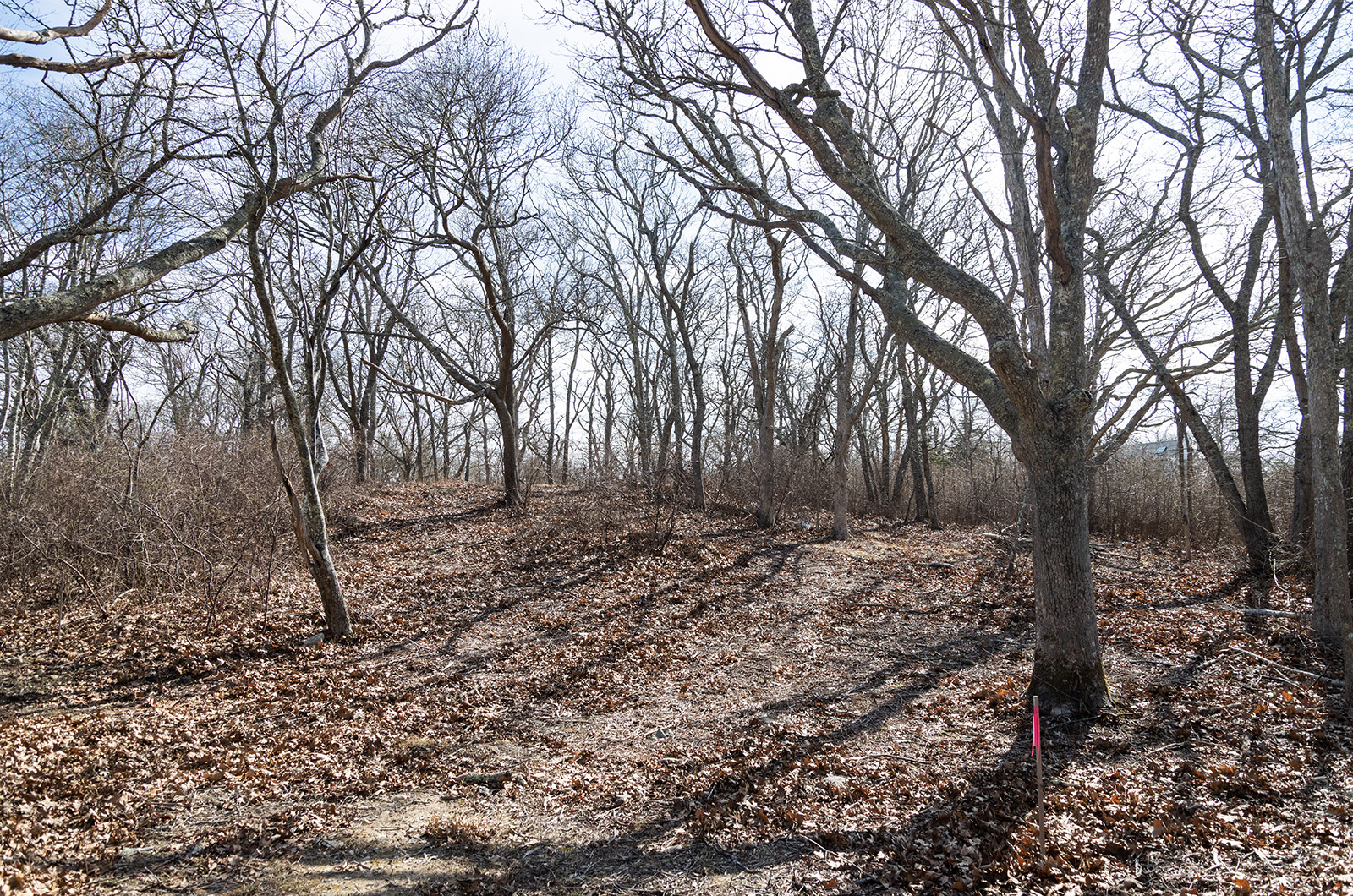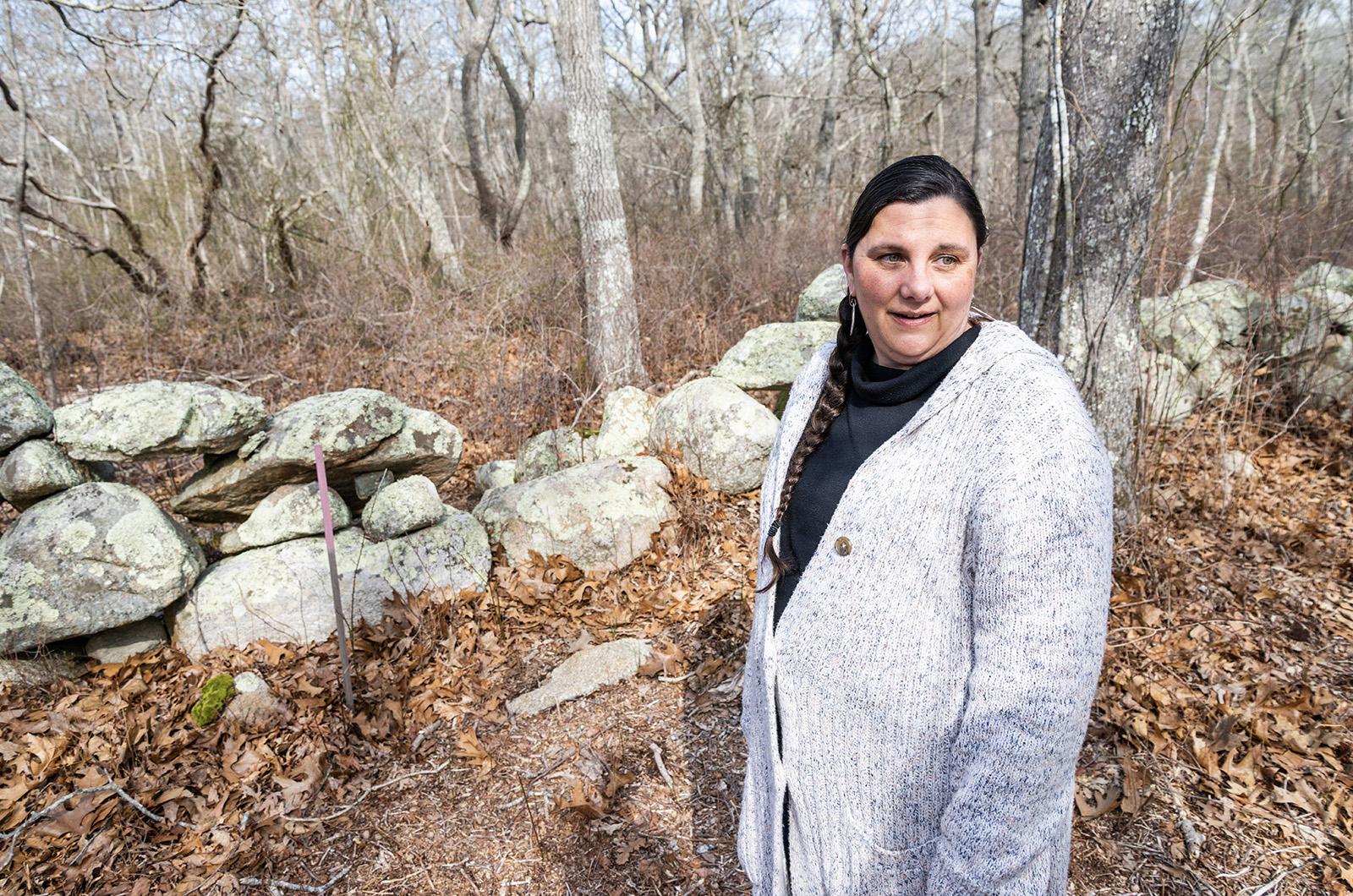Jennifer Randolph is standing on land that used to belong to the women of her tribe for centuries. This week, that land returned to her.
Ms. Randolph is the executive director of the Native-run nonprofit domestic violence program Kinship Heals, also known as the Northeast Native Network of Healing and Kinship. On Thursday, Kinship Heals closed on a property that will eventually become a food pantry, domestic violence shelter, and ceremonial site for members of the Wampanoag Tribe of Gay Head (Aquinnah).
Once the final structure is built, it will become one of 58 Native-run domestic violence shelters in the U.S., and the only one in Massachusetts.
In its current form, Kinship Heals has offered domestic violence services, including a food pantry, to tribal members since 2020. But for 10 years Ms. Randolph has had her sights on a permanent, physical location that can offer long-term support to tribal families experiencing domestic violence.
“My vision is for families to live in the house for at least a year,” she said. “It’s not just a shelter.”
With the sky-high land prices in Aquinnah and the Vineyard in general, it’s a vision she had relegated to a pipe dream — that is until she saw 7.8 acres in Aquinnah come up for sale earlier this year.
“It was everything we could have wanted for the work we wanted to do,” she said.
She reached out to two national nonprofits, the Kataly Foundation and the Solidaire Network, with news of the opportunity. Through their own funds and a network of more than a hundred individual donors, the two organizations were able to raise close to $2 million in just two months.
“I can’t even begin to describe the amount of love, although it’s funny to call money love . . . the outpouring of love and support that was given,” she said. “It was really amazing.”

The purchase is also a victory for what Ms. Randolph considers the larger project of rematriation, returning historically indigenous land to indigenous hands.
“It’s stolen land,” she said. “That’s just what it is.”
Rematriation, as opposed to repatriation, refers to the Wampanoag’s history of matrilineal land management, Ms. Randolph explained, with men going out to sea to fish while women managed domestic affairs.
“Why would you base your community on the men who may not return?” she said. “It’s the women that raise your communities, so land passed down through the women.”
The planned housing structure will be able to house up to two families, Ms. Randolph said, but she acknowledges that the need for housing is much higher. Many more people reach out for counseling services through the program, she said. The food pantry regularly serves 25 to 40 families a month, with that number increasing to 90 in the busier holiday season.
“It’s common for domestic violence services to help people more than once, as survivors of violence can often end up back in similar situations when they’re already vulnerable,” she said.
Violence against indigenous women is often overlooked, Ms. Randolph said, with few programs attuned to the specific challenges Native women face. A 2016 report by the U.S. Department of Justice found that one in three Native American women have experienced sexual violence, more than double the national average. That same report found that 96 per cent of indigenous women who have experienced violence describe their attacker as non-Native American.
“Sexual violence as we experience it today is a colonial import,” Ms. Randolph said.
Since the 1978 U.S. Supreme Court ruling Oliphant v. Suquamish Indian Tribe, tribes have had little authority to convict non-tribal perpetrators even for crimes committed on tribal land, instead depending on federal prosecutors to decide whether to pursue a case.
The 2013 Violence Against Women Reauthorization Act sought to partially address this issue by granting a special exception for domestic violence charges against non-Native individuals, but the legislation does little to account for the fact that domestic violence cases often go unreported.
As a survivor herself and a mother of three Native daughters, Ms. Randolph has accepted that her children will likely not be the exceptions to these statistics, even with all the knowledge she has passed down to them.
“There’s nothing you can do to prevent this from happening to you,” she said. “I think that’s a Native perspective from colonization. You can’t stop what happens to you, but you can know how to look past the stigma and the shame and get help faster.”
Eschewing both the criminal justice system and tribal government, Kinship Heals instead focuses on giving survivors the tools they need to heal, whether that be direct economic assistance or a community of women who understand what it means to be a Wampanoag survivor.
“Isolation is a powerful tool for abusers,” Ms. Randolph said while walking through the woods of her new property. Its location will be kept a secret, a common practice for domestic violence programs looking to protect victims from their abusers.
“Traditionally, Native women worked alongside each other all day, exchanging knowledge and forming kinship bonds,” she continued. “That’s how we had such a tight-knit community. That’s how we kept each other safe.”
Ms. Randolph gave the example of her recent attempt to nixtamalize indigenous corn in her home kitchen. It was a long, grueling process, she said, made much easier when she invited her friends and family to help.
Part of her goal for the new land is to recreate those ancient practices and rebuild the kinship bonds that have fallen by the wayside after centuries of displacement. While the shelter will be closed to the public, the grounds around it will host tribal ceremonies and even include a food forest of indigenous edible plants.
Her first order of business is to invite an ecologist to the property to determine the needs of the land, which includes both forest and wetlands, before construction. It could take upwards of three years for the building phase to be completed, Ms. Randolph said, assuming all the permits go through.
“I worry about ignorance,” she said. “Is someone going to fight us because they think we’re going to put a casino on it?”
She paused by a small brook flowing through the property and closed her eyes to better take in the sound. Even in the dry, dull foliage of early spring, she sees infinite possibilities for the space around her.
“My brain just explodes with ideas,” she said. “Can you imagine? This as a place of healing. It’s like another world.”







Comments (12)
Comments
Comment policy »